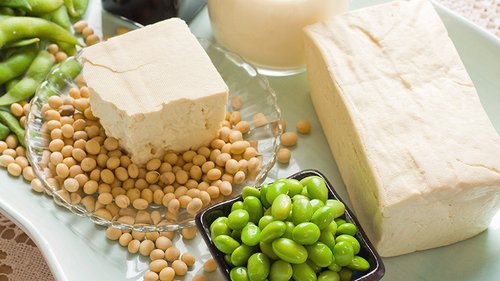Busting Soy Myths
By Riley Romazko
 Does soy increase estrogen? Does soy cause cancer? Should I stay away from soy?
Does soy increase estrogen? Does soy cause cancer? Should I stay away from soy?
There are many conflicting studies of soy and its effects on estrogen in both men & women. Some people are so afraid of soy and refuse to eat it because of many claims around it concerning hormones. Many of the studies that found hormonal disruptions were in studies with animals. Animals process soy differently than humans and the same effects have not been found in humans. Soy does indeed belong to a category called “phytoestrogens” and this term can make many people cringe, but their effects may surprise you.
Phytoestrogens are a series of plant chemicals that act like estrogen and are found in foods & herbs such as soy, beans, lavender, mint, licorice, fenugreek, marijuana (yes, crazy right!?), and others. Phytoestrogens are not just in soy- they’re in many plants- yet many people just pick on soy. Phytoestrogens bind to estrogen receptor sites, but only exert a two percent estrogenic activity compared to your body’s natural estrogen. In fact, the binding of phytoestrogens to your receptors can bump out harmful xenoestrogens. These are chemicals that mimic estrogen and often have anti-androgen (androgens are male dominant hormones) effects. Phytoestrogens such as soy isoflavones may help balance estrogen in the body and provide some protective effects for bone and estrogen-dependent cancers as well as menopausal symptoms. Studies have shown that soy has no effect on testosterone levels. While many doctors do not recommend phytoestrogens, there are some benefits to consuming them, if your body agrees with them.
If you are concerned with hormonal imbalances, the previously mentioned xenoestrogens may shock you. As stated, these are hormone chemicals that disguise as estrogen and are referred to as “endocrine or hormone disrupters.” Where do you find them? Xenoestrogens are often present in plastics (BPA, phthalates, PVC, etc), agricultural chemicals (DDT, atrazine, insecticides, cattle growth hormones, etc), and dioxin related to bleach. Dairy, fish, and meat can all contain xenoestrogen residues and so can typical household products & containers. We are all exposed to them, but high exposure can pose dangerous complications such as early puberty, reproductive cancer, male physiological feminization, and fertility issues. You can limit your exposure of xenoestrogens by purchasing organic, reducing plastic, and choosing more natural products. Research is still in development, but there have been some evidences of phytoestrogens aiding in eliminating xenoestrogens from the body.
I don’t want you to takeaway that I’m telling you to eat a bunch of soy. In fact, most of the soy in this country is processed and/or genetically modified and does not produce the same benefits as whole, organic, or fermented soy that contains isoflavones such as tofu, miso, & edamame. Any processed foods will exhibit negative effects and it’s no wonder that people are so afraid of soy. Processed soy is in so many things, but it is not to be confused with whole soy. Soy has shown to benefit arterial health in menopausal women, lower bad LDL cholesterol, and modestly lower blood pressure. It also displaces animal proteins, provides essential fatty acids, and can be incorporated into whole, plant based eating for further benefits. Some people do have allergies to soy and there can be many possible reasons for this. However, if you’re looking for a protective, complete plant protein, then soy may be a beneficial option and it is not be to feared.
https://rrfitness2u.com/blog/f/does-soy-increase-estrogen-does-soy-cause-cancer-soy-myths





